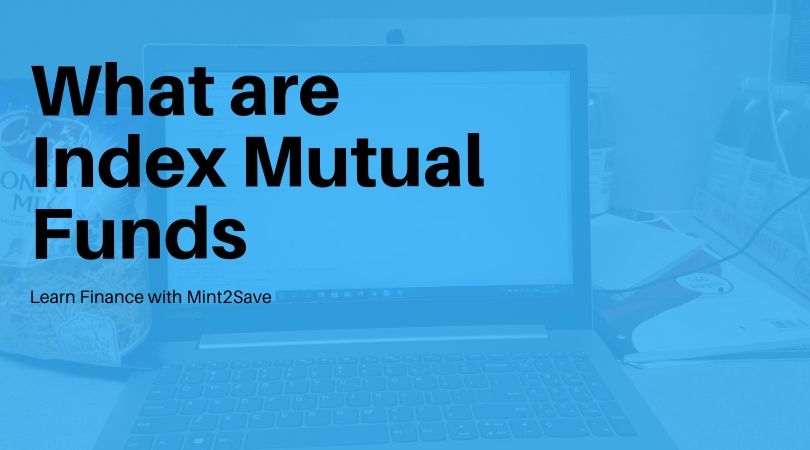What are Index Mutual Funds ?
- 17 December 2019 | 1655 Views | By Mint2Save

An index fund is a passive mutual fund. In a nutshell, Index funds are a group of shares or other securities that can be purchased as a bunch or group. The investment funds in portfolios were created to follow the results on market indices such as the Standard & Poor’s 500 index are index-linked investment funds. Hence are named as index mutual funds.
As the investor doesn’t have to actively participate in the funds, they are passive. Even the brokerage charge are very less comparatively. Warren Buffett, the living legend, is also recommending to invest in index mutual funds over mutual funds.
By buying index funds, you are becoming the owner of the entire group in shares. This will protect you against the risk of choosing the wrong equipment. In this index fund, some securities will increase and some will fall.
However, as noted by John Bogle, founder of Vanguard in his books, the entire stock market is still growing in the long run. This means that your portfolio (investment) reflects a wider stock market, your investment will grow for a long time, even when several individual shares fall.
What are traits of Index funds?
Here are the traits of Index Funds that you need to closely address before investing:
- High market exposure, lower turnover and lower operating costs are the traits of indexed investment funds.
- This fund effectively helps to track and reduce errors.
- Portfolio investment funds were created to track the results of market indices, such as the Standard & Poor’s 500 index, indexed investment funds.
- High market exposure, lower turnover and lower operating costs are the quality of indexed investment funds. This fund effectively helps to track and reduce errors.
- Low volatility
- 500 Index Fund Admiral Shares
- Long-term (domestic)
- Mid-Cap Index Fund Admiral Shares
- Small-Cap Index Fund Admiral Shares
- “Growth index” variants of the above. Growth funds have been around for a while but the growth index funds have only been around for a few years. They have lower expense fees and higher expected returns. However the volatility is considerable.
- Broad exposure including all the ranges of index shares
What Factors to consider while Investing in Index funds?
Investment preference will vary with respect to the investment necessity and objectives. The factors to consider before investing are – risk factor, the amount to be invested, tenures and other characteristics that will seriously influence the decision.
In a mutual fund, the activities undergone are all active. Whilst in an index fund you are investing passively. An index fund is a mutual fund that represents a particular segment whole market termed as an index.
The term index refers to the combination of small shares from several sectors and which results to form a portfolio termed as a market index. For example Nifty fifty compromise of about 50 shares which are enrolled from several sectors that holds the best position that particular sector.
The Sensex here also consists of about 30 shares added from several sectors that are best out of that. The term index plays a significant role by enabling higher returns when the market is at a growing stage by issuing the ETF (Exchange-traded funds) instrument. Index mutual fund refers to passively managed funds. The popular index in India is Nifty next 50 BSE small-cap BSE midcap.
Advantages of Index mutual fund
1. Low expenses
- The most efficient and effective advantage of an Index fund is low expenses which result in providing higher returns to the investor on their particular investment.
- Its cost savings ideology worked out really for enabling the investor engaged in Gavi large investments in an index mutual fund.
- Low expenses are incurred in turn with minimizing the time & money in analyzing the management fund.
2.Broad diversification
- One of the greatest & superior advantages held by the thousands of investors being a part of the index mutual fund.
- When we consider benchmark indices such as the S&P 500 or the Sensex, we observe the variety of the companies (in terms of business model, industry, revenue generation, etc.). Investing into these companies diversifies our risk, and thus, returns are relatively stable.
- The investors enrolled with higher equipped holdings consistently are engaged in low market risk or venture.
- The most attractive feature of an index mutual fund is that it is linked to the inherent growth of the companies and has no caveat to affect or alter its performance.
How to invest in Funds – index and other?
You don’t have to be super wealthy to invest in the stock market. Be it mutual funds or index funds. With the index funds that reflect S&P 500 actually includes 500 of the largest stock exchange companies. Your taxable investments are always calculated with respect to the performance of the largest stock market.
In 2007 Warren Buffett anticipated that that an S&P 500 index fund will outperform a group of hedge funds over 10 the past years then. Buffet was proved right again as usual. The bottom of the S&P 500 Index has beaten many really smart finance professionals who spend almost all of their time in earning as much money as possible.
The bull markets are named when the markets are having good and beneficial times. And the bad times are named as bear markets. The S&P 500 index fund assures you the profits made and the losses made by stock markets and through out the cycle of growth and fall of the stock market.
You’ll never be able to time the market perfectly, so the best advice is to invest regularly regardless of whether you think we are at the peak or the nadir (all-time low).
First a few things to ponder before investing:
- A broad exposure is not always the best exposure. For instance, the emerging markets are expected to have high flexibility, high uncertainty and low returns.
- In the forums and through media, actively managed funds are seen to be outperforming and index funds having higher commissions. It is necessary to know the role in particular portfolios like special tax management. It is often better to avoid such taxation.
- The investment time horizon is important in choosing a fund. For example, if the funds do not last more than 40 years, a small capitalization fund might make more sense. It has more volatility, but better expected returns. Volatility does not matter much for a long time. Indeed, after 40 years, even if a small capitalization fund is likely to bring more returns if it invests in a more cautious option until it withdraws.
Let us explore the options for choosing funds with respect to your investment budget and plans. All the indexed investment funds are most reliable are preferable options for investing. ETF equivalents is also a better option to go for, if you are willing to play safe in trading funds through a broker interpretation.
What are the best Index funds in India to buy?
Besides nifty 50, there isn’t really much to investment portfolios in India. For Nifty 50 we have around 13 funds available portfolios. However for Sensex and Nifty 50 we only have 5 and 4 funds respectively.
Following is the list of some popular index funds based on Nifty50, Sensex and other indices.
- Nifty 50
- UTI Nifty Index Fund
- IDFC Nifty Fund
- HDFC Index Nifty 50
- Sensex
- HDFC Index Sensex
- Reliance Index Fund – Sensex Plan
- Nifty Next 50
- UTI Nifty Next 50 Index Fund
- DSP Nifty Next 50 Index Fund
- ICICI Prudential Nifty Next 50 Index Fund
- IDBI Nifty Junior Index Growth
- Nifty Midcap
- Motilal Oswal Nifty Midcap 150 Index Fund
- Nifty Smallcap
- Motilal Oswal Nifty Smallcap 250 Index Fund
- Nifty Bank
- Motilal Oswal Bank Index Fund
- Nifty 500
- Motilal Oswal Nifty 500 Fund
How to select the best Index Funds for Nifty and Sensex?
As already discussed, index funds are not active investment management. It is not mandatory and not needed to analyze them in terms of returns, fund manager experience, risk factors as of other stock market shares. The index funds’ performance, risk and volatility is analogous to the Beta = 1 index. Furthermore, the manager’s experience is not important because he does not have to actively choose the actions.
There are only 2 basic things to remember before investing in index funds and we use them in our analysis to rank the best Nifty and Sensex indexed funds.
Expense Ratio – The highest cost ratios have a significant impact on complex returns. However, in the case of index funds, these expenses are generally low, as these funds do not require much research and others. That is why in our analysis we choose funds with a lower cost factor.
Tracking Error – The most important parameter to choose the best mutual fund. The tracking error is essentially how much the fund’s return differs from the following index. Therefore, to reduce the tracking error, the bottom is better.
Bottom Line
The index mutual funds are the safest and hectic-less investments to opt for. Especially when you are investing in the funds with broker, index funds will earn you a lot. For index funds, broker usually charges too low compared to the mutual funds and stocks. Moreover, there are options of SIP available. Your saving and investment is magnified without real effort, time and energy. This is why Warren Buffet is recommending the index funding for beginners or amateurs and other less risk-taking investors.









